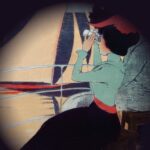 Náprstek Museum of Asian, African and American Cultures (PDF)
Náprstek Museum of Asian, African and American Cultures (PDF)
Time: 16.-17.10.2024
Venue: Praha
Proposals by: 31.07.2024
Like many other activities, travel has for many years remained the domain of men. It was a dangerous, time-consuming and financially demanding activity that was denied to women because it distracted them from their ’natural‘ duties. Leaving aside high-ranking and well-to-do noblewomen, the opportunity to travel did not open up to more women until the 19th century. Even then, however, it did not become a mass affair. To travel as a woman was still to cross not only geographical but also social boundaries.
The purpose of the Women Travellers ? Women on the Road conference is to discuss the phenomenon of women’s travel in the broadest possible context. The contributions can concern both women who are themselves travelers, i.e. female pilgrims, tourists or professional travelers, and women who have embarked on a journey as mere companions of their male counterparts, i.e. without their own travel plans and interests. The common theme of the contributions should be how these women reflected on their travel experience, which was significantly conditioned by gender roles, social status or cultural expectations and differences. Although the focus of the theme is in the 19th and 20th centuries, the contributions are not limited by time or geography. The organisers prefer the following topics:
TRAVEL BIOGRAPHIES
Personalities of women travellers often offer not only attractive biographies, but are also a good source of knowledge on how women travellers were perceived and accepted by the public. What social expectations were placed on them? Did they embody or subvert contemporary constructs of femininity? The biographical contributions will give preference to lesser known representatives of female travel.
Papers analysing historical representations of women travellers in general are also welcome.
EXPLORING, CONQUERING, SCIENTIFICALLY SUBDUING THE WORLD
Long, arduous journeys to distant lands, or even expeditions, were not only undertaken by men; to varying degrees, they were also undertaken by women, either as active participants or as companions in various travel expeditions. Many women also travelled for scientific purposes and made many important discoveries. How were their activities perceived? Were the results of their journeys appreciated? How were they integrated into scientific institutions that were purely male-dominated, and to what extent were they supported by these institutions?
FEMALE TRAVEL IN TEXTS AND IMAGES
A woman on the road is often the author of various documents that reflect her travel experiences and her experience of exploring foreign environments. Women travellers write travelogues, travel diaries or letters from their journeys, paint pictures and later take photographs.
What image of themselves do they build through these texts and images?
What roles do they style themselves into? How do they present female travelling itself? Is travel a subversion for them or do they ascribe other meanings to it?
WOMEN AND THE POLITICS OF TRAVEL
Women travellers, especially if they travelled independently, had to overcome all kinds of physical and psychological barriers, faced gender stereotypes and social conventions. Were institutional restrictions and limitations also applied to them? How did they balance personal autonomy with the laws and customs of foreign countries?
WOMEN AND COLONIAL PRACTICES
Women’s journeys in the past often headed to colonial areas. How did women travellers relate to the local population and to colonial practices? Did they participate in reinforcing the colonial paradigm or challenge it?
The conference will take place on 16-17 October 2024 at the Náprstek Museum of Asian, African and American Cultures, Betlémské nám?stí 1, Praha 1.
The conference languages are Czech and English.
Paper proposals, including annotations, should be sent by 31 July 2024 to womenandtravelconference@nm.cz
Call for papers (PDF)
Source: fernetzt mailing list
